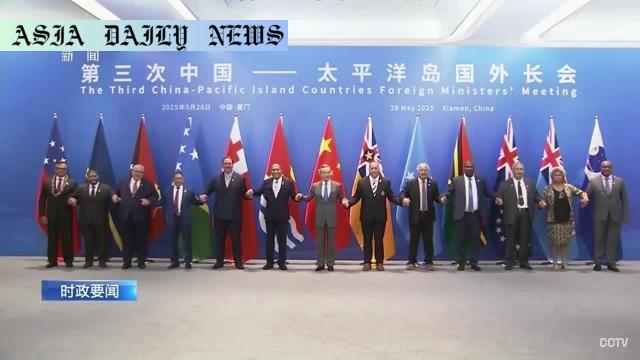Climate Change: Beijing emphasizes its position on climate support for Pacific nations, contrasting with the US withdrawal from global agreements.
China vows to support Pacific nations in tackling climate change.
Meeting included 11 Pacific nations and emphasized trade ties.
China contrasts its efforts with US withdrawal from climate agreements.
Pacific nations aim for stronger and sustainable partnerships.

China’s Strategic Commitment to Combat Climate Change
In a moment of decisive action for climate advocacy in the Pacific, China has reaffirmed its pledge to support Pacific island nations in addressing the dire impacts of global warming. Leveraging its diplomatic prowess, Beijing hosted a high-profile meeting in Xiamen, Fujian Province, bringing together foreign ministers and representatives from 11 island nations. Countries such as Kiribati, the Solomon Islands, and Nauru were key participants in this gathering, signaling their vested interest in forging sustainable partnerships.
A joint statement emerged from the meeting, underscoring commitments to strengthened bilateral trade relations and robust support for climate initiatives by the Chinese government. This landmark decision demonstrates China’s bid to extend its influence across the Pacific while emphasizing its active dedication to mitigating climate disasters. Amid the mounting global concern over environmental sustainability, this gesture places China firmly in the role of a proactive and reliable partner to fragile island nations facing existential threats from rising sea levels and temperature changes.
China’s Contrasting Climate Stance with the United States
The Chinese initiative is set against the backdrop of a stark contrast to the policies previously adopted by the United States under the Trump administration. The US withdrawal from the Paris Agreement, a crucial global accord for addressing climate challenges, left a vacuum in international environmental leadership. Additionally, the freezing of US aid programs in Pacific regions has raised significant concerns, particularly for small island states grappling with the disproportionate impact of global warming.
Recognizing this void, China has positioned itself as a more dependable ally. By maintaining a vested interest in these climate-affected nations, Beijing reinforces its narrative of taking meaningful global responsibility. The current Chinese prioritization of green financing, renewable energy projects, and technological innovation for sustainability highlights a proactive divergence from the perceived inaction of other major powers.
Strengthened Trade Ties as a Mechanism for Climate Resilience
Beyond its climate promises, China has pledged to deepen trade relations with Pacific island nations. These trade agreements aim to create economic buffers against vulnerabilities while fostering mutual growth. As developing nations, Pacific states often lack the infrastructure and financial resources required to adapt to harsh climate realities.
By emphasizing trade as a pillar of collaboration, China equips these states with economic tools to enhance their resilience. Enhanced trade flows stimulate job creation, strengthen national revenues, and contribute towards sustainable development mechanisms. In practical terms, Beijing’s unified strategy combines environmental and socio-economic empowerment under one umbrella.
The Broader Implications of China’s Actions
The support extended to Pacific nations positions China as a central power in shaping the future of environmental diplomacy. Countries reliant on subsistence livelihoods, eco-tourism, and fishing industries face existential threats from changing weather patterns and biodiversity loss.
Amidst these challenges, Beijing’s actions symbolically elevate its standing on the international stage. With US-Pacfic relations experiencing strain during prior years, China capitalized on creating a more compelling contrast by demonstrating climate empathy. Such long-term soft power tactics further appeal to global stakeholders seeking reliable partnerships for shared environmental goals.
Conclusion: A Crossroads for Global Environmental Leadership
As the global climate crisis intensifies, the onus for leadership falls on major economies to step forward with actionable solutions. Through its support for Pacific nations, China cements its reputation not only as a trade-centric giant but also as a proactive advocate for environmental stewardship on behalf of vulnerable communities.
Going forward, whether other nations emulate China’s efforts remains uncertain. However, by placing bold emphasis on planetary sustainability in a world fraught with geopolitical complexities, the Pacific island meeting marks a pivotal moment not just for regional partnerships but for global climate advocacy.
Commentary
China’s Bold Moves on Climate Advocacy
China’s recent pledge to support Pacific island nations marks a strategic and commendable move in climate diplomacy. By aligning itself with vulnerable countries dealing with the catastrophic impacts of global warming, Beijing not only reinforces its global influence but also addresses one of the most pressing challenges of our time. Its proactive stance starkly contrasts prior positions taken by certain other global powers and underscores its role as an emerging leader in environmental relationships.
Impacts Beyond Environmental Diplomacy
This initiative by China goes far beyond simply addressing climate-related issues. Building stronger trade ties with Pacific nations as part of the broader strategy provides these countries with financial resources and stability to adapt to the economic repercussions of climate change. It also demonstrates how environmental assistance can act as a catalyst for strengthening bilateral relationships on a global scale.
A New Chapter in International Collaboration
Ultimately, China’s actions could signal the beginning of a new chapter in international collaboration where nations work more cohesively toward mutual benefits. While it remains to be seen how sustainable and impactful Beijing’s actions will be in the long term, the immediate political and environmental implications are noteworthy. Such initiatives pave the way for open dialogue and more focused investments in climate-friendly technologies and trade practices.
Overall, the decisions made at this Pacific meeting reflect an important lesson: global solidarity and leadership are needed more than ever to fight shared threats like climate change. It is both refreshing and encouraging to see ambitious commitments in action.


